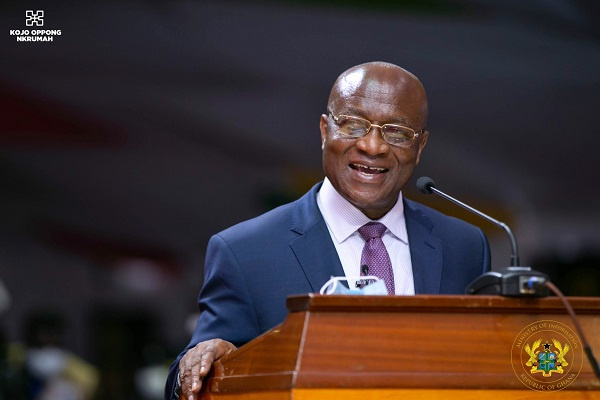In accordance with Articles 179 and 180 of the 1992 Constitution, President Nana Addo Dankwa Akufo-Addo designated the Minister of Parliamentary Affairs and leader of government business in Parliament, Osei Kyei-Mensah-Bonsu to read the 2021 Budget Statement in Parliament on Friday, March 12.
This was due to the nominee as Minister of Finance, Mr Ken Ofori-Atta, is still in the United States of America (USA) for a medical review. Early on, the Information Minister hinted as part of the post-COVID-19 economic recovery efforts, government is considering rolling out creative revenue mobilization measures to fund its projects. In that government needs creative revenue mobilization measures that will enable it to roll out its policies for the 2021 fiscal year.
Domestic revenue mobilization (DRM) refers to the generation of government revenue from domestic resources, from tax or non-tax sources. Improving DRM of developing countries is a crucial factor in sustainable development. According to research conducted by the Ghana Anti-Corruption Coalition (GACC) in 2020, about 1.5 million out of the six million eligible Ghanaian taxpayers pay tax, making Ghana one of the lowest tax to Gross Domestic Product (GDP) ratio in Africa.
So, Ghana has a lot to do to meet the Sub-Saharan average target of 17 per cent which is above the nation’s 13 per cent mark as her various governments have over the years tried to upscale the country’s challenge of collecting less tax and relying mostly on external help: International Monetary Fund, World Bank, bonds and others.
That notwithstanding, the country has lost US$10 billion in tax exemption incentives in the last two years. Corollary to that is the problem of government’s high expenditure and astronomic debt (both external and domestic) the firm need to mobilize more funds from DRM by increasing existing taxes and creating new ones in this year’s budget.
A favourable investment climate must be thought of as being a necessary but not a sufficient condition for attracting foreign investment. To support businesses come out of the COVID-19 pandemic’s crisis and to speed up the much needed economic recovery, some reforms aimed at reducing the tax burden on businesses must be implemented but not excessively providing tax exemption incentives to businesses.
The International Monetary Fund has estimated that the global economy contracted by 3.5 percent while global trade also contracted by 9.6 percent. The COVID-19 pandemic has upended the economies of over 150 countries and is the worst economic crisis since the Great Depression in the 1930s. The economy of Ghana grew 0.9 per cent in 2020 despite the overwhelming fear that it will have negative growth rate because of the pandemic, but overall GDP for 2021 is projected to grow at 5.0 per cent.
2020 Mid-Year COVID-19 Budget
Last year, the Finance Minister, Ken Ofori-Atta, in reading the mid-year COVID-19 budget stated that the provisional fiscal data for first-half of the year show that revenue mobilisation fell short of target by 26 percent – resulting mainly from shortfalls in oil revenue, customs receipts and non-oil Non-Tax revenues. Total revenue and grants for January to June 2020 amounted to GH¢22 billion compared with a programmed target of GH¢29.7 billion.
Non-oil tax revenue, comprising taxes on income and property, goods and services and international trade, amounted to GH¢16.7billion or 4.3 percent of GDP – 16.2 percent below the programmed target of GH¢19.9 billion or 5.2 percent of GDP.
Also the Finance Minister revealed in parliament that some of the tax revenue mobilisation measures government plans to introduce include digitisation of tax compliance processes and tax education; frequent tax audits; implementation of an enhanced property rate collection system; implementation of the revised transfer pricing regulations; and prosecution of tax offenders.
But we notice that most of these proposals are yet to be realized or were not reviewed this year. While we encourage government to reduce the tax burden on businesses, the implementation of the digitization of tax compliance processes and tax education and prosecution of tax offenders would potentially offer a boost in revenue generation for government to improve domestic revenue mobilization. .
2021 Budget in Perspective
Since government proffered the need for creative revenue mobilization measures to enable it to roll out its policies for the 2021 fiscal year, it introduced some new taxes and adjusted existing ones upward to generate more revenue to take care of high expenditure in the 2021 budget. And these taxes are:
- NHIS, VAT flat rate up by 1% each
- New sanitation and pollution levy
- Energy Sector Recovery Levy
- Financial sector clean-up levy with 5% extra income tax
- Road tolls revised
- Introduction of new gaming policy
VAT and NHIL (COVID-19 Health Levy)
To provide the requisite resources to address these challenges of COVID-19 pandemic and fund some health projects, government proposed the introduction of a COVID-19 Health Levy of a one percentage point increase in the National Health Insurance Levy (NHIL) and a one percentage point increase in the VAT Flat Rate to support expenditures related to COVID-19.
It is worthwhile to know that VAT and NHIL are both sales tax, i.e., a regressive tax. Unlike a progressive tax imposes larger burden on the wealthy to incentivize revenue for social amenities, a regressive tax imposes larger burden on lower income earners. So, it is our view that the increment of the VAT and NHIL (COVID-19 Health Levy) to pay for the health program is misplaced as it is going to cause financial burden to budget of low income earners or poor people.
Moreover, the COVID-19 health levy has a compounding effect as it is non-deductible as input tax. So the effect on inflation of prices of goods and services may be in excess of 3 per cent (assuming a wholesaler imports, and sells to a retailer who then sells to the final consumer).
Sanitation and Pollution Levy and Energy Sector Levy
Government proposed a Sanitation and Pollution Levy (SPL) of 10 pesewas on the price per litre of petrol/diesel under the Energy Sector Levies Act (ESLA) to embark on sanitation and pollution project. In addition, there is also 20 pesewas per liter Energy Sector Recovery Levy meant to defray the over $2 billion debt owed to Independent Power Producers (IPPs).
Already Ghanaians are saddled with too much to pay for petroleum products and this addition of SPL is going to intensify the burden. Fuel prices increased from GH₵ 4.7 per liter to GH₵ 5.7 per liter over the past two months. Obviously, the SPL is a tax incidence with a burden on the welfare of Ghanaians together the inflation of goods and services.
For that, we agree with Chamber of Petroleum Consumers (COPEC) that government should dedicate efforts to ensure that Tema Oil Refinery (TOR) functions well so that petroleum products could be processed locally which would effectively reduce the cost of fuel in the country.
Moreover, government should review the Price Stabilization and Recovery Levy (PSRL) under ESLA meant to cushion consumers from any further increases of fuel prices since it has not be upheld by government.
Financial sector clean-up levy with 5% extra income tax
According to government, the financial sector clean-up and the refund of monies to depositors have resulted in a huge cost of over GH¢21.0 billion to government; therefore, it introduced a financial sector clean-up levy of 5 per cent on profit-before-tax of banks to help defray outstanding commitments in the sector. In addition to that, banks are already liable to pay corporate tax and 5 per cent National Fiscal Stabilization Levy (NFSL) on the profit-before-tax.
Despite the fact that government would be able mobilize additional revenue for use for introducing this new tax, the downside is that cost of borrowing will go up which will have a lot of pass through effects on the final consumer.
Furthermore, some banks could actually cut down on staff in order to be efficient yielding to the loss of jobs crisis caused by the financial sector clean-up. This intricacy would affect investment, especially Foreign Direct Investment (FDI), if the ordination of the FDI has not tax exemption incentives from government.
New gaming policy
Government introduced a new tax on online betting which it said it is because it is estimated that Ghana loses over GH¢300 million annually in revenue due to leakages in the sector. This tax is laudable and worthy of its introduction. We state that the argument that online betting should be banned should not be encouraged. This is because, the tax on online betting is a ‘sin tax’ or regressive tax imposed to discourage people from somewhat engaging in the activity.
Much more, government cannot ban online betting in this day and age unless it does cyber monitoring of the online betting companies and block their Uniform Resource Locator (URL). Even with that, there are Virtual Private Networks (VPNs). On top of that, online betting companies rely heavily on cashless system of transaction. So, if the Mobile Network Operators (MNOs) deny integration of these online companies, they will be surely banned. But that would look like killing a fly with a sledge hammer. It is both unnecessary and unsurmountable.
Conclusion
Total revenue for 2021 is projected at GH¢ 72 billion equivalent 16.7 per cent GDP. Domestic revenue is estimated at GH¢ 70 billion in 2021 with non-oil tax to constitute 74 per cent and amount of GH¢ 53 billion – equivalent to 12.4 per cent GDP. Essentially, revenue for this year’s budget leverages on domestic tax. However, for business to be able to recover from the COVID-19 pandemic effectively, DRM should be done in a way to reduce the tax burden on the taxpayer to generate more revenue, and it is riveting to know that this year’s budget is rather compounding the financial burden on the taxpayer.


Michael Sumaila Nlasia is a research assistant at Center for Data Processing and Geo-Spatial Analysis (CEDPA), and a graduate of GIMPA Law Faculty. Email: [email protected]
Frank Nartey Tetteh is a Branch Manager of Fidelity Bank, and a graduate of GIMPA Law Faculty. Email: [email protected]










